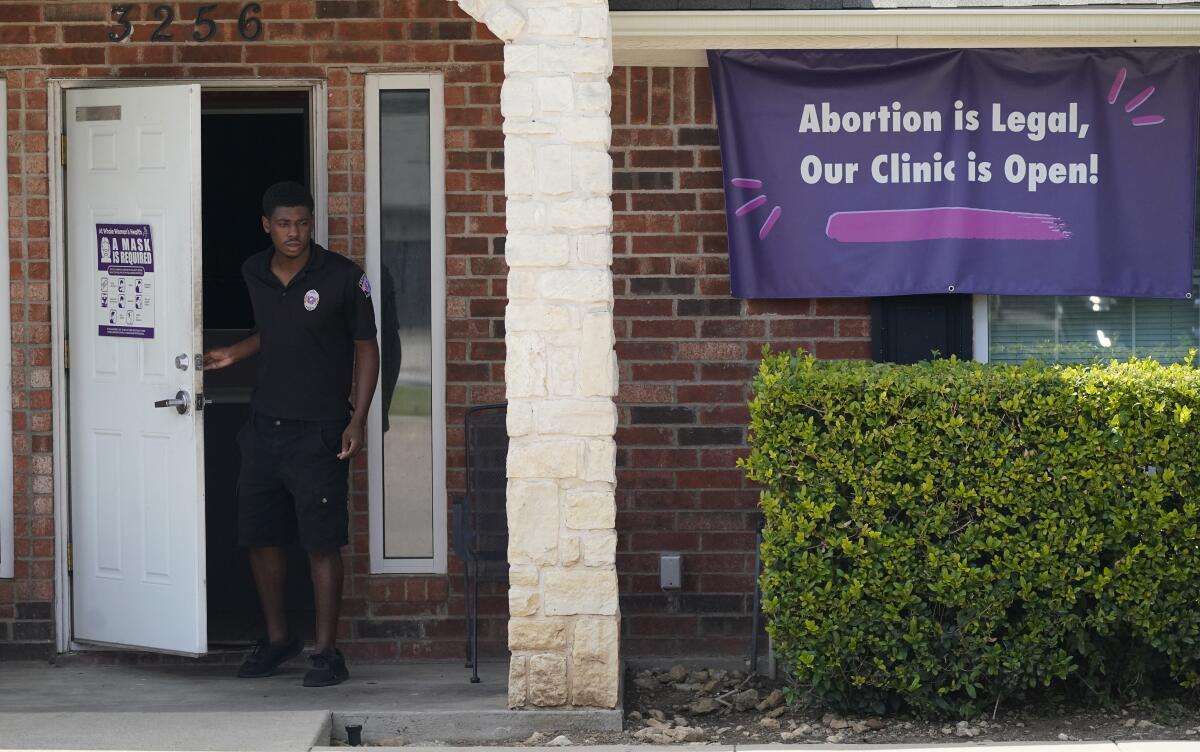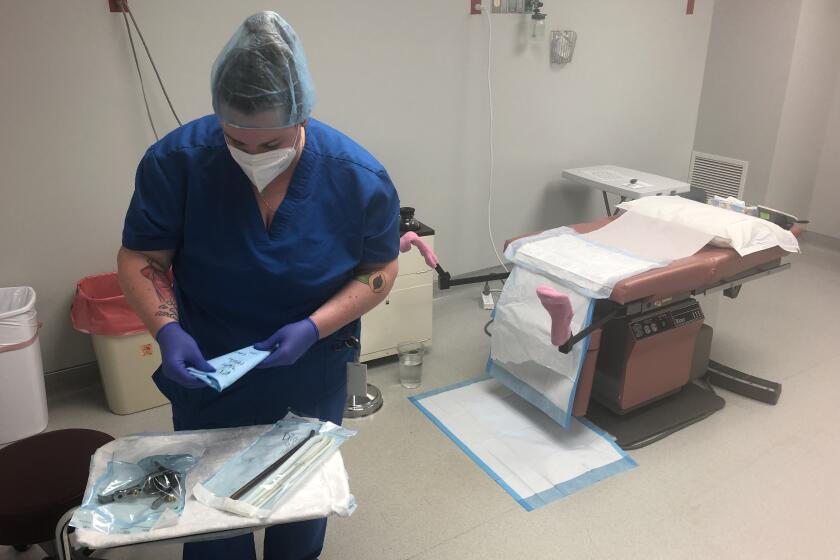Op-Ed: What it’s like operating a Texas abortion clinic under the state’s new ban

It’s been nearly a month since our country’s cruelest abortion ban went into effect. As of midnight Sept. 1, most Texans seeking abortion care have been left powerless and afraid. Providing abortion care in Texas was difficult before, but now we are living in a dystopian nightmare. Let me share what it was like on the night of Aug. 31 at Whole Woman’s Health of Fort Worth.
In the hours leading up to midnight, the waiting room was filled with patients hoping to get an abortion before Senate Bill 8 went into effect. Staffers and doctors had been working since 7:30 a.m., and they were still there providing abortions until 11:56 p.m. Outside, the antiabortion protesters kept us under tight surveillance all day long. Come nightfall, they shined flashlights into patients’ cars, the clinic and the parking lot. Inside the clinic, there was love, support, bravery, integrity and deep commitment to human rights. We held out hope that the Supreme Court would bar the law from going into effect. But that justice never came.
Today, it is illegal to provide abortions after about six weeks in Texas. Whole Woman’s Health and Whole Woman’s Health Alliance clinics are still open and providing abortions, but every day we turn away most people who need abortion care. We provide abortions for the few we can help — those who are lucky enough to make it in under the narrow limit. Six weeks pregnant means just two weeks past your missed period. As for those who are denied care? They are stunned, numb, frozen.
This law goes against everything we believe in. It prevents doctors from treating patients and turns Texans’ care over to self-appointed vigilantes who are encouraged by a bounty reward system. We’d prefer to defy this unjust ban, but SB 8 is far too terrifying. Our staffers are being surveilled constantly — from the protesters on our sidewalks to the threatening phone calls we get every day. People who are eager to sue us send fake patients into our clinics to see if we will break the law. Our nurses, medical assistants, and counselors are alert, afraid, anxious, worried, and in fear. Many of our physicians have opted out of providing care while SB 8 is in effect. It is just too risky for them. It is a horror tale.
SB 8 puts incredible power into the hands of people who have terrorized us and our patients for decades. And lawmakers in other states are already following in Texas’ footsteps. The Florida Legislature recently introduced a copycat bill, hoping to severely limit abortion access the same way as Texas. There is no saying where this will stop.
SB 8 comes on top of layers of restrictions on people’s access to abortion in Texas. For the last two decades, Texas politicians have imposed forced ultrasounds, a ban on using Medicaid or insurance, two-visit requirements, a mandated 24-hour waiting period, operational regulatory schemes, a ban on a standard abortion method, gestational limits, ambulatory surgical centers facility standards, etc. As if this wasn’t enough, just over a week ago a ban on medication abortion after 49 days was signed into law, and it’s set to go into effect Dec. 2.
With each restriction, more people are unable to get the abortion care they need. People of color and young people are the most affected. These laws haven’t improved health outcomes, made pregnancies safer or prevented unplanned pregnancy. In fact, the maternal mortality rate in Texas is on par with the rates in developing countries.
I founded Whole Woman’s Health in 2003 in Texas because I believe all people — no matter where they live — deserve access to quality abortion care that is delivered with respect and dignity. We take on the shame and stigma that has been created by those who oppose abortion and defend this constitutionally protected right against political interference and intimidation. I now operate four clinics in Texas and five more across the South and the Midwest — where compassionate care is needed most.
Over the last 18 years, the hurdles to operate abortion clinics in Texas have become mountains. We fought against insidious attacks like SB 8 before. In fact, we won our 2016 case, Whole Woman’s Health vs. Hellerstedt, at the Supreme Court. But clinics can’t fix all these problems alone. If clinics close because SB 8 is enforced long enough to drain all our resources, the damage will be done even if it is eventually struck down.
So, why should all Americans care? Because what happens in Texas rarely stays in Texas. Texas is a barometer for abortion care in this country — Roe vs. Wade was also a Texas case. The truth about Texas? SB 8 does not reflect Texas values or the feelings and beliefs of most Texans. Yet the powerful few have weaponized abortion stigma into laws like SB 8.
And let’s be clear — there are no “safe haven” states for people who need abortions, only states with fewer barriers. Even in states such as California or New York, with state law protections for abortion, many who need care can’t travel the distance to the nearest clinic, or can’t afford the cost of their care, or can’t take time from work or find child care for their kids.
Propelled by a very restrictive abortion law, Texas women are traveling farther afield for abortions.
Millions of people — men and women — have benefited from access to abortion in this country. Abortion bans like SB 8 rob us of our ability to make decisions about our lives and futures, to support our families, to pursue our dreams, to remain safe and whole, to be healthy. The people of Texas are suffering every day this law stays in effect.
Amy Hagstrom Miller is the CEO and founder of Whole Woman’s Health and Whole Woman’s Health Alliance.
More to Read
A cure for the common opinion
Get thought-provoking perspectives with our weekly newsletter.
You may occasionally receive promotional content from the Los Angeles Times.











